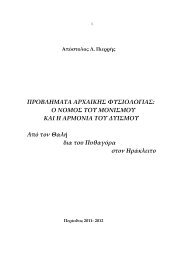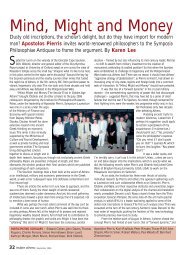APPENDIX C΄ ON DEPILATION: BODY COSMETICS IN CLASSICAL ...
APPENDIX C΄ ON DEPILATION: BODY COSMETICS IN CLASSICAL ...
APPENDIX C΄ ON DEPILATION: BODY COSMETICS IN CLASSICAL ...
You also want an ePaper? Increase the reach of your titles
YUMPU automatically turns print PDFs into web optimized ePapers that Google loves.
<strong>ON</strong> DEPILATI<strong>ON</strong>: <strong>BODY</strong> <strong>COSMETICS</strong> <strong>IN</strong> <strong>CLASSICAL</strong> ANTIQUITY 573<br />
enjoy the gymnastic games, at which he was excellent: v. Hyginus,<br />
Fabula XCI: ille amore incensus tauri sui (his favourite one) descendit<br />
in certamen et omnia vicit, fratres quoque suos superavit, etc. Virgil<br />
also implies Paris’ supremacy in athletic certamens: Aeneas V, 270<br />
where see Servius’ commentary for further details. The distinction<br />
between occupation in, and preoccupation with, war or gymnastic<br />
contests, stretched back as far as the Dioscouroi, at least; excellence in<br />
either was a mark of eminent manhood, an example of àÓ‰Ú›·: v. e.g.<br />
Apollodorus, Bibliotheca, III, 134: ÙáÓ ‰b âÎ §‹‰·˜ ÁÂÓÔÌ¤ÓˆÓ apple·›-<br />
‰ˆÓ, K¿ÛÙˆÚ ÌbÓ õÛÎÂÈ Ùa ηÙa applefiÏÂÌÔÓ, ÔÏ˘‰Â‡Î˘ ‰b apple˘ÁÌ‹Ó,<br />
ηd ‰Èa ÙcÓ àÓ‰Ú›·Ó âÎÏ‹ıËÛ·Ó àÌÊfiÙÂÚÔÈ ¢ÈfiÛÎÔ˘ÚÔÈ. In fact<br />
Pollux was the one of definitely divine (Jovial) origin, v. e.g. ibid. III,<br />
126). But when provoked, Paris entered the lists with gusto see<br />
Homer’s brilliant description in Iliad, Z, 506-514. This is the general<br />
notion one gets from Homer, especially the long narration where Paris<br />
is essentially involved in Rhapsodies Γ and Z.<br />
So when Lycophron (v. 91) calls him apple‡Á·ÚÁÔÓ, we need not<br />
suppose that anything radically different is involved than what<br />
Aeschylus implies by assimilating Menelaus to this species of eagle.<br />
^A‚ÚfiÙ˘, yes, may well be involved (Euripides, Orestes, 348 sqq:<br />
K·d ÌcÓ ‚·ÛÈÏÂf˜ ¬‰Â ‰c ÛÙ›¯ÂÈ,<br />
MÂӤϷԘ ôÓ·Í, appleÔÏf˜ ê‚ÚÔÛ‡ÓFË<br />
‰ÉÏÔ˜ ïÚÄÛı·È,<br />
ÙáÓ T·ÓÙ·ÏȉáÓ âÍ ·¥Ì·ÙÔ˜ üÓ.<br />
I wonder whether appleÔχ˜ is not the correct reading, which having<br />
deteriorated to appleÔχ ‰’, ended in appleÔÏÏFÉ, appleÔÏÏFÉ ‰’ etc.). But, as I have<br />
argued in extenso, grace and beauty were not incompatible with a<br />
well-built body and athletic excellence.<br />
Now whiteness, especially in the loins, thighs and adjacent regions<br />
of the body, may well have been part of the point in calling men like<br />
Menelaus or Paris (who where Ï¢ÎÔ›) apple‡Á·ÚÁÔ˘˜. And here it is that<br />
the associations coming from the character of that species of eagle were<br />
intertangled with implications deriving from an ancient dictum or<br />
proverb: Ì‹ Ù¢ ÌÂÏ·Ìapple‡ÁÔ˘ Ù‡¯F˘. As a proverb, the phrase was<br />
extremely common: Tzetzes, Chiliad. V, 94: ì apple·ÚÔÈÌ›· apple¿Ó‰ËÌÔ˜<br />
Ì˘Ú›ÔȘ ÏÂÏÂÁ̤ÓË. It is explained (in the form Ìc Û‡ Á ÌÂÏ. Ù‡¯ÔȘ)










